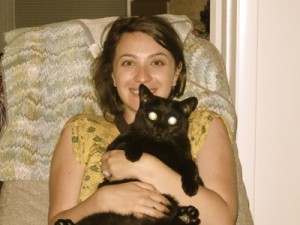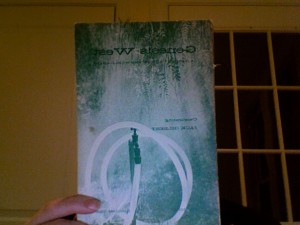Mike Young—
Hey my little Lisbon doorknob: one has one’s house, where one might hum a song from a 1970s sitcom, one’s face gold for the stream, locking one’s doors with the lack of an erection, the erector sets no one would steal, then leaving, taking a sip every time one passes a crow on a fence, while another new rain dumps from the complicated sky, while you staple Clint Eastwood’s face over your own, while another sits on a bench and stares at the bridge, moonlight spiking off his belly, and that’s just the fiction in the new Alice Blue Review, which you’ll want, a want conjoining with your want of the Blue Collar Sun under which it takes place, and in the next seat over is the poetry section, where Jordan Stemplemann—among fine companions—burrows into you with the following: “No matter who / takes over the world, // they will build / within us one stiff // twin called astonishment, / unable to ever unlive.”

 A friend recently sent along some wondering for submission to GIANT discussion. Their question (skip down to the blue if you want to avoid me getting off topic with brain science) maybe intersects Lily’s post yesterday about the definition (and neurobiology) of creativity. Is there “hardwiring” involved in our expression/communication motivations? Is that expression/communication goal-based or process-based? Do we need intense pompadours? I’m getting farther afield with each question I add to the question I haven’t even shown you yet, but I’ve been reading Antonio Damasio’s The Feeling of What Happens: Body and Emotion in the Making of Consciousness, which proposes (among many things) that emotions and feelings are different (emotions are in the body, feelings are the mind’s awareness of emotions), and that we evolved consciousness in order to be aware of our having feelings. Not just feelings, but our having of them. In other words, we have a mind in order to know how we feel. I can’t help but make lazy/lyrical connections between my anonymous friend’s question and those ideas, but I’m feeling too lazy/lyrical to do much besides wonder. I invite you, kind people, to do more. Here is my friend’s question:
A friend recently sent along some wondering for submission to GIANT discussion. Their question (skip down to the blue if you want to avoid me getting off topic with brain science) maybe intersects Lily’s post yesterday about the definition (and neurobiology) of creativity. Is there “hardwiring” involved in our expression/communication motivations? Is that expression/communication goal-based or process-based? Do we need intense pompadours? I’m getting farther afield with each question I add to the question I haven’t even shown you yet, but I’ve been reading Antonio Damasio’s The Feeling of What Happens: Body and Emotion in the Making of Consciousness, which proposes (among many things) that emotions and feelings are different (emotions are in the body, feelings are the mind’s awareness of emotions), and that we evolved consciousness in order to be aware of our having feelings. Not just feelings, but our having of them. In other words, we have a mind in order to know how we feel. I can’t help but make lazy/lyrical connections between my anonymous friend’s question and those ideas, but I’m feeling too lazy/lyrical to do much besides wonder. I invite you, kind people, to do more. Here is my friend’s question:


 Today at the tree-tucked magic barn of
Today at the tree-tucked magic barn of 